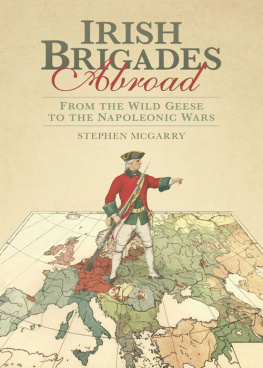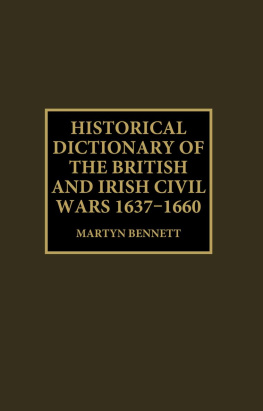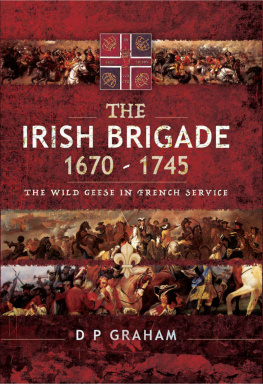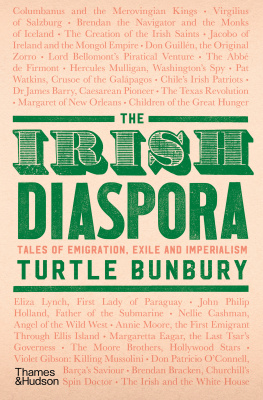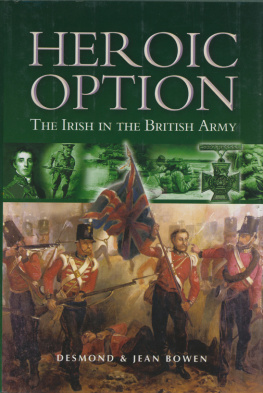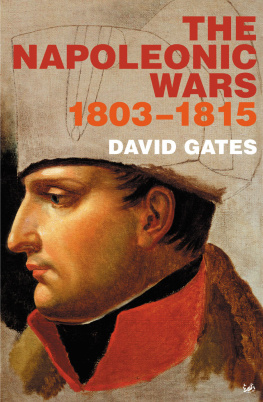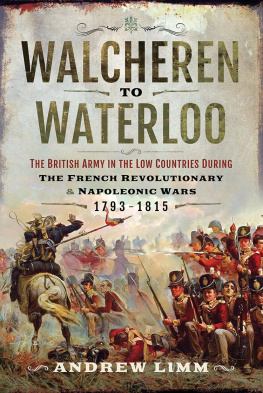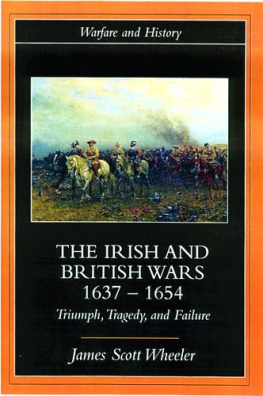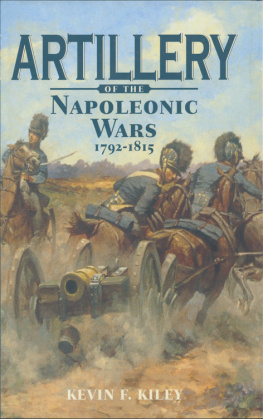In memory of my father
C ONTENTS
From the time of King James IIs reign over the three kingdoms of England, Scotland and Ireland, swashbuckling young Irishmen achieved great success and fought with distinction in most of the major battles in Europe and beyond. The prospects for the ordinary Catholic in Ireland in the eighteenth century were bleak and, perhaps not unlike modern emigrants, the best and brightest were often forced away. Many of those who left saw the undertaking of military service on the Continent as only a temporary condition. While contemporary Irish emigrants might look to Australia or Canada in search of a better life, during the eighteenth century the Irish turned to France and Spain, countries with well-established Irish communities. This book will look at how they fared, from the War of the Grand Alliance in 1688 right through to the Napoleonic Wars. What emerges is a picture of honour, chivalry and integrity, of self-sacrifice and, above all, of great adventure.
Irish troops displayed these qualities numerous times, such as when they volunteered to cover the retreat of the French army against the Germans in 1735; or their near-suicidal attack launched to capture George IIs son, HRH the Duke of Cumberland, during the Battle of Lafelt. When Napoleons Irish Legion proudly marched through the French town of Verdun, the legion band played Saint Patricks Day in the Morning, aware that there were captured British POWs billeted in the town. One must also not forget their plan to rescue the French queen, Marie Antoinette, during the French Revolution, or the epic musketry duel fought during the famous Battle of Malplaquet between two Irish regiments, one in the French and the other in the British army. The Battle of Fontenoy (1745) was their highest battle honour, when six Irish regiments in the French army were largely responsible for breaking a British infantry advance and secured victory.
The formation of the Irish Brigade of France began with an exchange of nearly 6,000 French for Irish troops during the Jacobite War (168991), which became Mountcashels Irish Brigade. The Irish supported the Catholic king, James II, in the war, which was fought in Ireland. James had been deposed and fought to regain his crown against the Protestant king, William of Orange, who had usurped him during the Glorious Revolution. Conflict in eighteenth-century Europe was generally along religious lines and the Jacobite War was no exception. The Protestant countries of England, Holland and Prussia (including Catholic Austria and Portugal) were frequently at war with the Catholic countries of France and Spain. The wars repercussions resonated deeply in Northern Ireland, particularly during The Troubles in the twentieth century, and are still felt today. Some sections of the Protestant Unionist community annually commemorate their victory over the Catholics at the Battle of the Boyne, fought over 300 years previously.
After the Jacobite War, the Irish army withdrew to France. This exodus became known romantically as the Flight of the Wild Geese, and spearheaded Irish migration to the Continent. The term the Wild Geese evoked the migratory flight of the birds in autumn and was used on ships manifests for the secret transport of Irish recruits to armies overseas. The Irish followed James II, who had been forced into exile in France, and were known as Jacobites, from Jacobus (the Latin form of James). The Treaty of Limerick (1691) guaranteed Catholic rights after the war but these rights were removed by the Penal Laws. Catholics turned to military service abroad, which offered an escape and was frequently the launching pad into successful careers in government or in business. Land forfeitures by 1700 left only one-sixth of land in Catholic hands and the Irish took up the Jacobite cause in the hope that they would regain their rights and lands with a Stuart Restoration.
Irish migration to the Continent dates back to the golden age of the Irish Church ( AD 600800). In this period, Irish missionaries were credited with re-establishing Christianity following the collapse of the Roman Empire that had brought Europe into the Dark Ages. Ireland had remained independent of Roman rule and escaped the ravages that occurred after the Empires collapse, due in part to its geographical remoteness on the periphery of Western Europe. The country had been a rebellious and troublesome colony since the twelfth-century English conquest and military links with the Continent were established after failed Irish rebellions. Many fled to France and Spain where they were perceived as soldiers of conscience, having similarities to the earlier crusaders. They adhered to their Catholic religion despite pressure to convert to Protestantism, preferring to serve abroad under arms and in so doing forfeiting their estates at home.
Irish military service in Spain dates from the Flight of the Earls in 1607, when Gaelic chieftains Owen Roe ONeill and Hugh ODonnell settled in Spain. They established the Tyrone and Tyrconnell regiments but both were disbanded by the close of the seventeenth century. The Irish Brigade of Spain comprised the regiments of OMahony, Crofton, Fitzharris, Bourkes, Castlear, MacAuliffe and Comerford. In 1709 these were re-formed into the regiments of Hibernia, Ultonia (Ulster) and Irlanda who remained in Spanish service until 1818. The Irish had always capitalised on the shared Milesian origins between the peoples of Ireland and Spain, which they used to their full advantage to gain privileges at court or for support for their cause. The Milesians were the early Celtic people who invaded, settled and ruled Ireland in the first millennium BC . The Irish also owed allegiance to the House of Stuart, as they believed the Stuarts were descended from the old Milesian kings of Ireland.
Of all the Wild Geese who went to the Continent, those who went to France were the most successful and contributed most both militarily and politically during the period. France eclipsed Spain as their preferred destination, due to the ease of migration to France and Flanders from Ireland. The Flight of the Wild Geese in 1691 also reinforced links in France over Spain, as the overwhelming majority of Jacobites in France were Irishmen in the service of France. France assisted Ireland in the Jacobite War, and the French king, Louis XIV maintained James in Saint Germain, Paris which encouraged his followers to settle there. The Irish Brigades were the Jacobite army-in-waiting and were central to any plots for a Catholic Restoration. Paris became the chief centre of the various plots and conspiracies to restore the Stuarts, whose efforts to regain the ancestral throne found their most zealous supporters in the exiled nobility and gentry of Ireland. France was used by the Irish as a platform for invading the British Isles. The Channel ports were the preferred embarkation point due to the short run across, and the Irish regiments were frequently stationed there and threatened British national security. In 1728, Charles Forman, the English pamphleteer, observed:
As long as there is a body of Irish Roman Catholic troops abroad, the chevalier [James III] will always make some figure in Europe by the credit they give him; and be considered as a prince that has a brave and well-disciplined army of veterans at his services; though he wants that opportunity to employ them at present, which he expects time and fortune will favour him with they [the Irish] are British subjects and speak the same language with us, and are consequently the fittest troops to invade us with.
The Irish regiments of France went through many changes in their history. The French formed a unit known as the Irish Brigade, comprising the Irish infantry regiments, for practical, cultural and linguistic reasons. The sole Irish cavalry regiment of Fitzjames served alongside other French cavalry regiments. In 1690, Mountcashels Irish Brigade in France comprised the regiments of Dillons, Clares, Mountcashels and Dorringtons. Shortly afterwards these were joined by Sheldons horse, Albemarles, Galmoys and Bourkes. When the French army was re-organised in 1715 only five Irish regiments remained: Clares, Dillons, Dorringtons, Lees and Nugents (later Fitzjames). In 1744, Lallys was formed along with the Scottish Royal Ecossais (Royal Scots) to support the Stuart claim. Lallys and Fitzjames horse were disbanded in 1762, followed by the Scottish regiments. In 1775, the Brigade was reduced to three regiments Berwicks, Walshs and Dillons all of whom were disbanded after the French Revolution.
Next page
